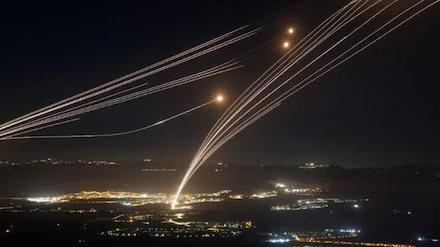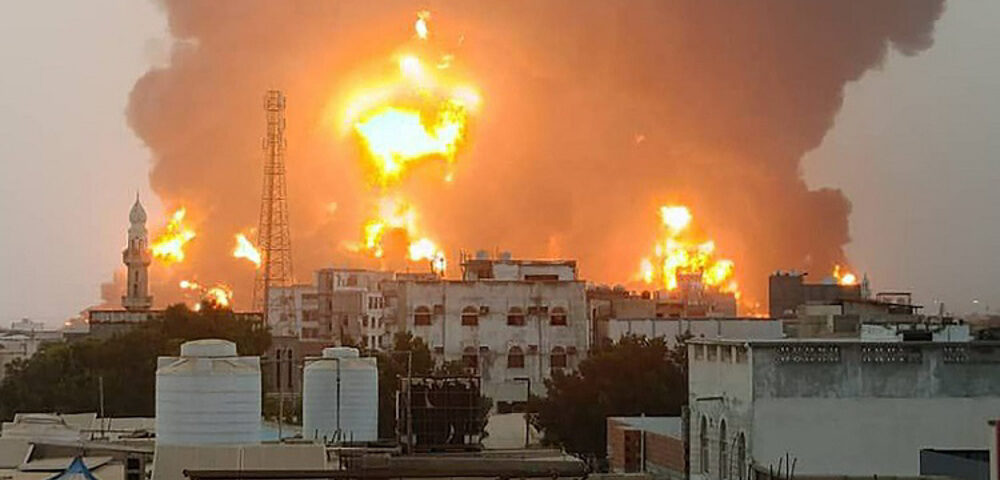
Urgent Vaccination Campaign Launched in Pakistan Amid Surge in Polio Cases
October 25, 2024
“Beyoncé Joins Harris in Houston for Campaign Rally”
October 26, 2024The airstrikes, carried out early Saturday, focused on sites in Tehran, Khuzestan, and Ilam provinces.

The Israeli Defense Forces (IDF) declared the mission a success, as airstrikes were launched on military sites in Iran early on Saturday, framing the operation as a retaliatory move against a missile attack Tehran had launched earlier in the month.
The strikes, which targeted military installations in Tehran, Khuzestan, and Ilam provinces, were reported by Iranian state-affiliated media. The first explosions were heard around 2 a.m. local time (2330 WAT on Friday), and multiple blasts followed over the course of several hours. Iran’s military responded by claiming that its air defense systems had intercepted some of the incoming missiles, limiting the damage. Despite these efforts, the airstrikes have left the region on high alert, fueling concerns of further military escalation between the two countries.
This latest flare-up comes amid an already volatile situation in the region, following a series of intense clashes between Israeli forces and Iran-backed militant groups. Tensions have been steadily rising since the devastating Hamas attack on Israel on October 7, 2023, which left hundreds dead and triggered a fierce Israeli military response in Gaza. The attack was widely seen as being supported by Hezbollah, a militant group based in Lebanon and backed by Iran. In recent weeks, Israeli forces have been engaged in ongoing military operations against Hezbollah in Lebanon, while continuing their campaign against Hamas in Gaza.
The strikes against Iran signal a broadening of the conflict beyond Israel’s immediate borders, and many analysts fear that this could draw in other regional and global powers. The United States, which has been a strong supporter of Israel’s military actions in Gaza, is closely monitoring the situation. Washington has already signaled its commitment to Israel’s defense, but an overt military confrontation between Israel and Iran could complicate U.S. involvement in the region, especially given its ongoing efforts to prevent the conflict from spiraling into a broader war.
The Israeli government has long expressed concerns over Iran’s growing influence in the Middle East, particularly through its proxy forces such as Hezbollah and Hamas. Israeli officials have repeatedly accused Tehran of orchestrating and funding militant activities against Israel, both directly and indirectly. Iran, for its part, denies these allegations, framing its support for groups like Hezbollah and Hamas as part of its broader strategy to oppose Western influence in the region and support Palestinian resistance against Israeli occupation.
The October 7 Hamas attack and the ensuing military operations have deepened the animosity between Israel and Iran, setting the stage for this latest confrontation. In a statement, the Israeli military framed its airstrikes on Iran as part of a broader effort to neutralize Iranian threats. “In response to months of continuous attacks from the regime in Iran against the State of Israel – right now the Israel Defense Forces is conducting precise strikes on military targets in Iran,” the statement read.
The timing of the strikes is significant, as they come just weeks after Israeli forces ramped up their operations against Hezbollah in Lebanon. Over the past few months, Israeli officials have voiced growing concerns that Hezbollah, with Iran’s backing, could open a second front in the conflict. Israeli airstrikes in Lebanon have targeted Hezbollah positions in an attempt to prevent the group from launching cross-border attacks into Israel.
Iran’s response to the Israeli strikes has so far been measured, with officials downplaying the extent of the damage. State-affiliated media quoted military sources as saying that Iran’s air defense systems had successfully intercepted several Israeli missiles, limiting the impact to only “limited damage.” However, the Iranian government has yet to issue a formal statement regarding its next steps, leaving the international community on edge as to whether Tehran will escalate the conflict further.
For Israel, the airstrikes represent a significant escalation in its strategy of countering Iranian influence in the region. Israeli leaders have been vocal in their opposition to Iran’s nuclear program and its support for militant groups. By targeting military infrastructure within Iran itself, Israel has sent a clear message that it is willing to take bold actions to defend itself, even if it means expanding the scope of the conflict.
This growing confrontation between Israel and Iran is also playing out against the backdrop of broader geopolitical shifts in the region. Iran has increasingly positioned itself as a leader of the so-called “Axis of Resistance,” which includes Hezbollah, Hamas, and other groups opposed to Israel and U.S. influence in the Middle East. Israel, meanwhile, has cultivated closer ties with Arab nations like the United Arab Emirates and Bahrain through the Abraham Accords, agreements brokered by the U.S. to normalize relations between Israel and several Arab states.
Despite these diplomatic gains, Israel’s relationship with Iran remains deeply antagonistic, and the latest round of airstrikes underscores how quickly the conflict can escalate. As both countries brace for potential retaliatory actions, the international community is calling for restraint to prevent the situation from spiraling into a full-blown regional war. The United Nations and several European nations have urged both sides to engage in dialogue and avoid further military confrontations.
In the coming days, all eyes will be on Iran’s next move. While Israel has achieved its immediate military objectives, the long-term consequences of its strikes on Iran remain unclear. What is certain, however, is that the already fragile situation in the Middle East has just become significantly more dangerous. The potential for further military actions, coupled with the ever-present risk of miscalculation, makes this one of the most perilous moments in the region’s recent history.


